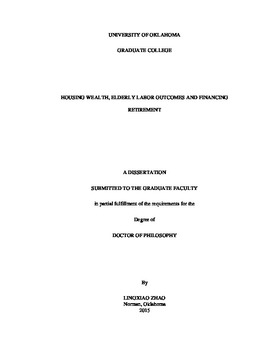| dc.description.abstract | The first chapter of my dissertation uses the restricted access version of the Health and Retirement Survey (HRS) data to examine elderly workers responses to changes in housing wealth, property taxes and financial wealth. The findings suggest older workers respond to variation in housing wealth and property taxes in the predicted opposing directions, that wealth influences labor supply to a lesser extent than factors like health and marital status, and that the effect of housing wealth on labor supply varies significantly by gender and age. Collectively, this set of findings answers several questions, but additionally motivates my second essay.
In my second chapter, the effects of housing wealth and property taxes on older households are further explored, focusing on the timing of retirement and unretirement decisions. Early retirement expectations are also considered and I identify factors associated with cases where gaps exist between expectations and later retirement realizations. I again use the restricted access HRS data to carry out this investigation. The findings complement my first essay by verifying that both retirement and unretirement transitions are affected by housing wealth, property taxes and financial wealth in expected directions. However, only financial wealth serves as major mechanisms through which expectations influence retirement behaviors. Unexpected changes in retirement decisions seem to be directly influenced by housing wealth shocks.
Chapter 3 focuses on the market for reverse mortgages. Reverse mortgages have played an increasingly important role as one of the major options available to elderly homeowners who wish to use their current home equity to finance consumption during their retirement. This places it on par with other important housing related decisions, such as downsizing, migrating to low cost regions, direct withdrawals of home equity, and exiting homeownership in favor of renting or even moving into an assisted living arrangement. My analysis relies primarily on loan level Home Equity Conversion Mortgage (HECM) data from the Department of Housing and Urban Development (HUD) and housing price index data from the Federal Housing Finance Agency (FHFA). The paper aims to investigate factors influencing the demand for reverse mortgages, emphasizing the role of changes in housing prices. The primary contribution of the paper comes from exploring the potentially asymmetric effect of changing housing prices on reverse mortgage originations. Intuitively, both the current price level and the expected future price level should influence this decision making process. While the results should be viewed as preliminary, I find evidence to support this claim. Finally, the essay examines whether or not these effects vary across different types of family arrangements (e.g., single, married, with and without children). | en_US |
